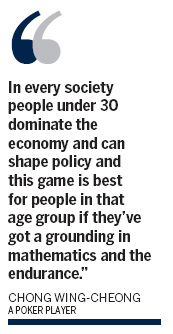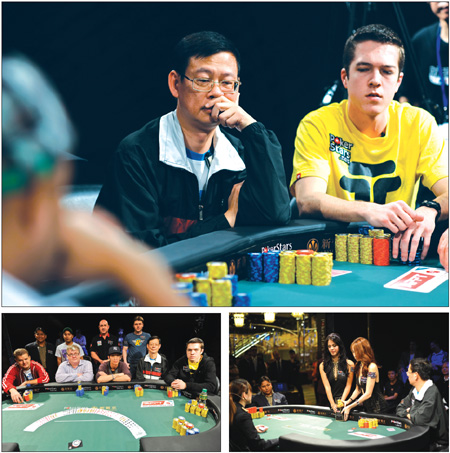Poker face-off
Updated: 2010-06-11 07:38
By Tim Chui(HK Edition)
|
|||||||
|
Top: Hong Kong businessman Chong Wing-cheong gets a second-place finish at the Macau Asia Pacific Poker Tournament in May. He is the highest placing Chinese player in the four years of the tournament. Above left: The nine finalists at the tournament. Above right: Chong loses out to his rival, Northern Mariana Islands attorney Victorino Torres. Provided to China Daily |
The success of a Hong Kong poker player at Asia's largest poker tournament earlier this year underscores the game's growing popularity in this part of the world. But as we learn in this report from Tim Chui, poker in Hong Kong continues to hover in a legal gray area.
There were nine, seated around the table: an Englishman called "Camel", an American of Korean descent, an attorney from the Northern Mariana Islands, two Danes, a Swede, a Kiwi, a Costa Rican and 55-year-old retired Hong Kong businessman Chong Wing-cheong.
The nine at the table were the last of 342 who had paid HK$40,000 each for entry to the Macau Asia Pacific Poker Tournament last month. With its prize pool of HK$16 million in 2009, the tournament holds the title as the richest poker tournament in Asia.
Above them, staring down from beneath the vaulted ceiling of the Grand Lisboa Casino, sat two tiers of spectators, looking down at the poker-faced nine.
The game was Texas Hold 'em poker'; the challenge - to make the best five-card hand from five open cards on the table and two hole cards face down in front of each player.
Each hand has four rounds of betting. In it's most popular form, there's no betting limit, so players can bet their wad on a single hand.

Seven hours later, only Chong and Northern Mariana Islands attorney Victorino Torres were left to compete for the then HK$9.7 million in prize money.
Chong considers himself a numbers man. His decades of experience conducting business in the corporate world have imbued him with a preternatural understanding of probabilities, which comes in handy when he gambles.
He's so good that his play is scrutinized carefully when he goes to Macao to play. He claims to have been barred from playing baccarat at major casinos in Macao and Las Vegas, for "counting cards". Card counting involves a player's ability to keep track of which cards have been dealt and then calculate which cards are left.
It's not illegal, but card counters who play against the house at significantly improved odds usually find their welcomes withdrawn at casinos once they are discovered.
Chong was able to dominate earlier rounds of the tournament in Macao in May - by calculating probabilities and doing some deft number crunching. But the marathon play, spread over the four days of the tournament, was getting to Chong.
"At my age," said Chong, "I don't have the energy to play for so long. In the beginning when I'm fresh I'll win a lot but over time I wear out without rest. I start losing focus and I can't read my own cards, let alone others'."
Betting strategy is also key to the tournament. A player can attempt to devour his opponents whole but end up getting popped himself.
Chong knew his chances were good. He's earned over HK$8 million at various venues since he learned the game just under two years ago. It started one night in Macao, during a typhoon. Chong was not able to get back to his hotel, the Venetian, that night, so he battened down at the Grand Lisboa and passed the time by trying his hand at poker.
At the final round of the Macau Asia Pacific Poker Tournament, Chong ultimately lost out to his rival, Torres, but still walked away with more than HK$2 million for his second-place finish. He also earned the distinction of becoming the highest placing Chinese player in the four years of the tournament.
Chong moves and speaks carefully, a bespeckled, nearly six-foot specimen older than he looks with a soft spoken manner. He doesn't appear a man to flout the law.
Chong says he has to leave Hong Kong to indulge his new hobby since he retired. He gave a resounding "NO" when asked if he ever dabbled at a "serious" game in the city.
In Hong Kong, poker is in a legal gray area. Under the law a game is not illegal if, "the game is one in which dice, dominoes, mahjong, tin kau tiles, or playing cards are used and A: the game is played on a social occasion or B: the game is not played by any person in charge of, managing or involved in the operation," according to the Hong Kong Gambling Ordinance.
In short, so long as the house is licensed as a club, doesn't take a cut of the action and the people playing are members gathering for a "social occasion" it isn't unlawful.
Even though the game, when played under the proper circumstances, isn't illegal, the fact it exists in a legal gray area has organizers skittish, fearful that the city's gambling monopoly and the powers that be will one day try to "muscle in" or move them out, said a person responsible for setting up one of the city's handful of poker houses.
Although it would be difficult to quantify the number of players, if you take the demographic at Chong's final table and Hong Kong's bigger expatriate and overseas born Chinese segments together, it's not a hard guess which city has the bigger pool of players.
The poker game, imported into Hong Kong became wildly popular in the early part of the decade, becoming the most common game in US casinos. Its popularity was helped along by televised tournaments, online gaming sites, a string of movies and a series of wins by non-professional players.
Not everyone is up for a two-hour round trip to Macao, so locally, groups of friends, usually male, usually university educated, with some exposure to Western culture, meet at a flat or rent out a private mahjong room for a friendly game. More committed players can find a seat at one of a handful of poker rooms in town, most of which are legally licensed.
Perhaps the most recognized and well organized is the Hong Kong Poker Room (HKPR) started by Kelly Flynn who also owns an outfit manufacturing poker chips on the mainland.
Sponsored by the Asia Pacific Poker Tour, the HKPR was the first club to offer the game legally in Hong Kong. It had more than 3,000 players in its database in 2008 and is still the premier spot for people in the city looking for some action.
Although they are pricier, you get what you pay for at poker houses, which boast, "high quality, full sized tables", "trendy bar space" and "beautiful well-trained dealers", but for players looking for cheaper action, various online groups organize "social events" such as the HK Geo meet-up group which gathers at the Best Club in Causeway Bay for some very friendly (cheap) action on Fridays.
Even though they see no part of the poker profits, organizers of poker houses still find peace of mind eludes them, while operating in the legal shadows. That's especially the case after a bust at the Blue Room on Central's Stanley Street earlier this year. Fifteen people were arrested, 13 were charged with contravening the Gambling Ordinance.
According to reports, the organizers at the Blue Room often took part in the games. An undercover policeman allegedly was able to join the game without club membership.
The police raid preceded by the undercover operation showed there is pressure on these so-far tolerated operations but changing attitudes and demographics may open the door to more acceptance of the game.
Shanghai born Pokerstars Asia pro player Celine Lin Pei-fei said she thought the game had legs in Asia. She thinks the game's mechanics are a natural fit for mahjong and big-deuce players. Former Hong Kong resident and back-to-back World Series of Poker Champion Johnny Chan thinks there is a lot of room for growth in the game which he said was the only game in which players could actually make a living.
Although Chong earned his personal fortune well before he learned to play poker, he thinks younger people will be the key to the game's future success in the region.
"In every society people under 30 dominate the economy and can shape policy and this game is best for people in that age group if they've got a grounding in mathematics and the endurance," Chong said.
Although the Home Affairs Bureau has not received any applications for opening up new betting activities or channels, "younger poker players today will have more money and influence when they are older so there could be more relaxed attitudes to the game if its popularity can survive that long," Anthony Fung, professor of popular culture at the Chinese University of Hong Kong said.
But bets on poker being on par with mahjong is a long shot, Fung conceded, saying, "It will be very difficult for poker to be accepted along the same lines as Mahjong because mahjong is very deeply ingrained in Chinese culture and I don't think we'll see poker at weddings any time soon."
(HK Edition 06/11/2010 page2)
